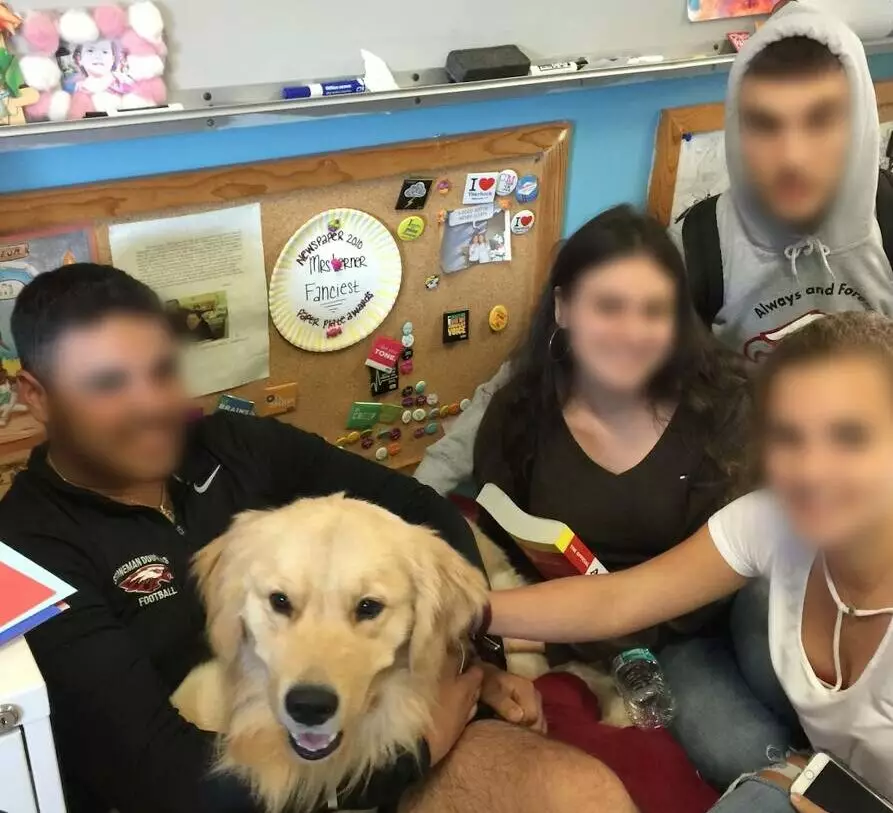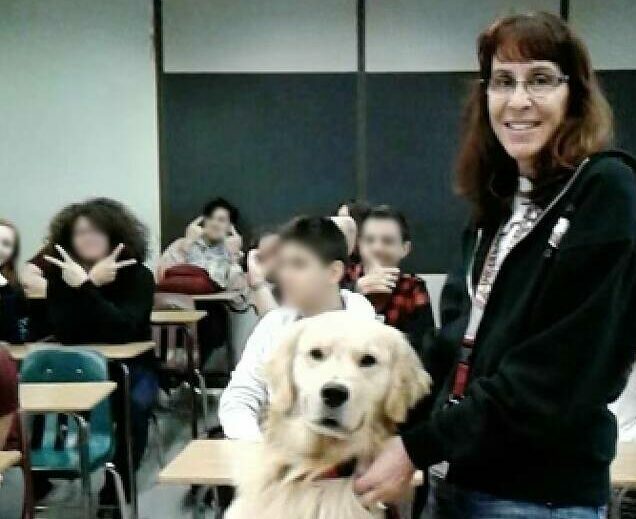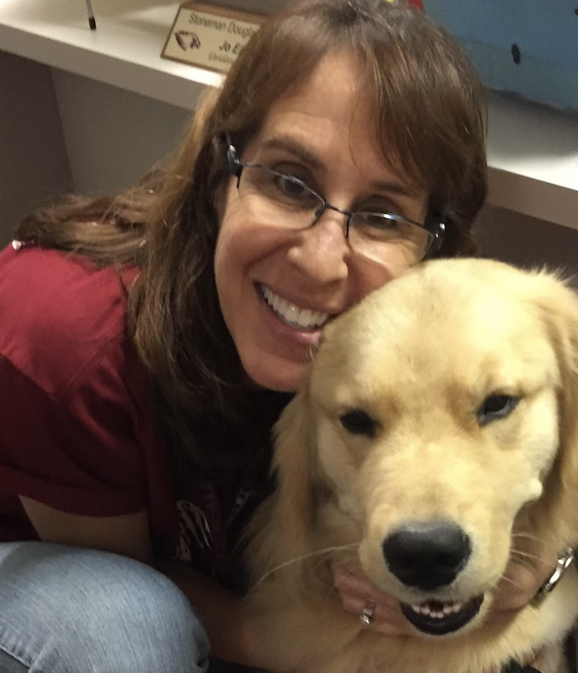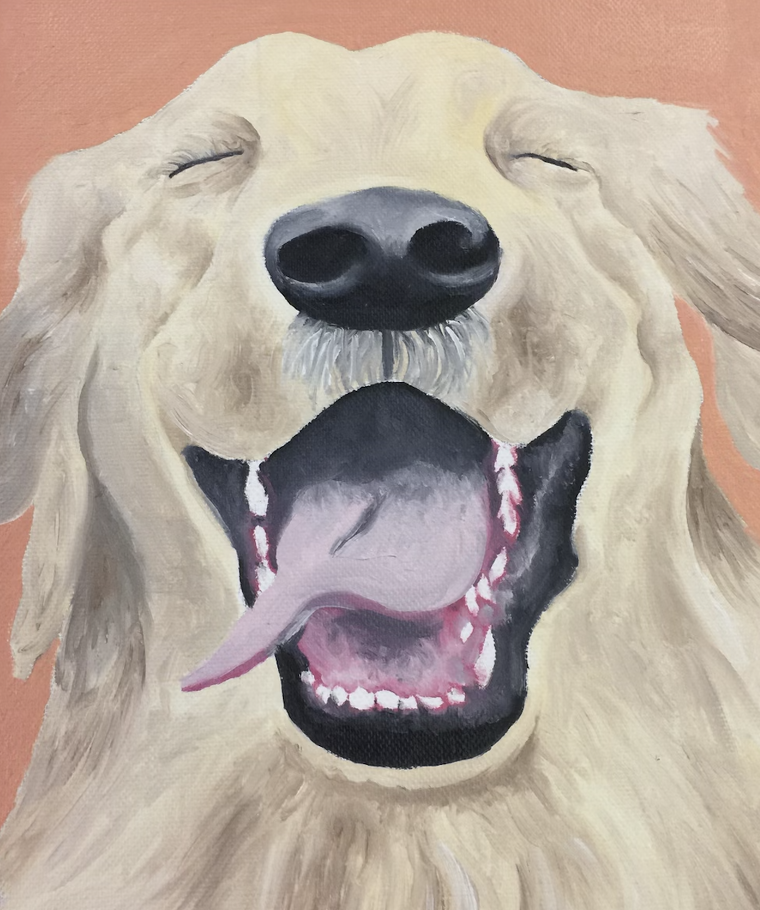ZYRTEC Pet Pawsitivity Walk Challenge
It’s Walk Time
Driving back to Marjorie Stoneman Douglas High School in Parkland, Florida, after the shooting, Ivy was scared. Two weeks before, in the middle of teaching a class about the Holocaust, she had seen two of her beautiful, bright students killed in front of her. Four others were wounded. Ivy had been at the school for twenty years and was determined to return, to see “her kids” through this. Despite the huge size of the school, Ivy knew all of her students as if they were her own. She didn’t know how to navigate the road ahead—the school’s plans for reopening seemed haphazard at best—but she knew Luigi would be there to help. That would have to be enough.
In the period between the shooting and school reopening, life had been a whirlwind of funerals and memorial services, including a memorial run for a teacher killed in the shooting. People and organizations had flocked to help the survivors. Everywhere she looked, Ivy saw therapists, doctors, trauma groups—people who had travelled miles to assist. For Ivy, her heart heavy with her own memories, none of it looked helpful. Until she went to that memorial run and saw a group of women with beautiful, calm dogs standing to the side.
“Something clicked inside of me and I thought ‘that’s what I need’.” She went to talk to them. The women were from a group called PAWS, from Naples on the west coast of Florida. They trained service dogs for veterans. PAWS thought the dogs might be helpful. They were trained to be calm and offer support when needed, along with more complicated tasks. A group of their volunteers packed up the pups they were raising and training and drove to Parkland. Which is how Ivy found them at the memorial run, standing by to offer comfort. She bee-lined towards them.
Among them was Luigi, a fluffy golden retriever with a big personality and an intuition for knowing who was hurting. He was being trained for a wounded Navy SEAL. But Ivy knew he was the one who could help her beloved students find their bearings in a world turned upside down as they navigated the campus in the aftermath.
Geri, Luigi’s handler, understood immediately. When the reopening of the school was scheduled, Luigi would be there for Ivy and her students. That terrifying day, as Ivy drove back to the school to resume teaching, that was her kernel of hope: Luigi will be there.
Right from the get-go, Luigi knew what to do. The students gravitated to him. In between classes, Ivy and Luigi would stand in the hall and everyone would stop for a hug or a pat. There were therapy animals all over the school—in the library, in the campus courtyards—but Luigi was different. “For some students the only thing that brought them back to class was knowing Luigi would be there,” she remembers. Even students from other classes depended on him. “We were always starting class late because kids would come to see him before going to their own classes.”
In the chaos of those days, no one worried about student tardiness. Ivy had to abandon everything in her own classroom when she and her students fled the shooting. Her old classroom was sealed as they had left it, a time capsule of horror, and with it all of Ivy’s materials and notes.

She was issued a cart and spent the day pushing it among different classrooms to teach. Despite the constant movement and the slapdash nature of everything, there was one constant: Luigi. Whatever classroom Ivy was in, Luigi was there too, greeting students, lying in a bean-bag chair with students around him, offering consistency and care.
For Geri, the volunteer raising Luigi, committing to Ivy and her classes was a huge sacrifice that she offered with compassion. Geri lived in Naples. She would go home on weekends to see family and work on Luigi’s training (he was still being trained for the wounded veteran) and return to Parkland, staying in hotels during the week. Though his official service dog career hadn’t started yet, Luigi had a job.
During breaks, Ivy and Luigi would wander the lunch room and the campus. Luigi had a gift for knowing who needed him and would approach students he had never met. His solid presence and happy countenance gave everyone confidence. On particularly hard days, he always had a bit more to give. When the local Jewish Federation sent gift baskets for Ivy’s students, Luigi delivered them one by one to each student’s desk, holding the handles gently in his mouth.
“He brought those kids back to class and he kept them there. And he helped me keep going.” Ivy remembers Annie,* who had seen her classmate shot next to her. She had told Ivy if Luigi wasn’t coming to school, neither would she. The students brought him gifts and painted him in art class. In a place with so much hurt and grief, Luigi brought comfort and laughter.
For the rest of the school year, Luigi and Geri came to class with Ivy every day. When the school year ended, Luigi returned to Naples to graduate and begin life as a service dog. PAWS reached out to Ivy: They knew she needed a service dog for her own PTSD. Despite being trained for the veteran, they were willing to offer her Luigi.

Ivy and her husband attended Luigi’s graduation. “During the graduation, I saw everything he had been trained for. He could push a wheelchair, perform highly specialized tasks.”
And with that, Ivy’s heart broke a little. As much as she loved Luigi, as much as he had saved them all, she knew in her heart she couldn’t take him. The veteran needed him even more.
With tears in her eyes, she left. “He was really something. He kept us all going.”
***
Ivy returned to Marjorie Stoneman Douglas High School the following year to see her remaining juniors through graduation. Her family then moved to the Northeast, where she continues to work in education with her own service dog, Sayde. She stays in touch with many of her students as well as Geri, the handler who gave so much to keep Luigi in the school that year.
Luigi now lives with a wounded Navy SEAL as his service dog.
The names of students were changed and their faces blurred to protect their privacy.
*Annie (not her real name) has applied for her own therapy dog.
